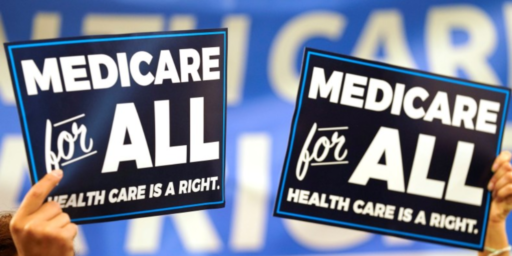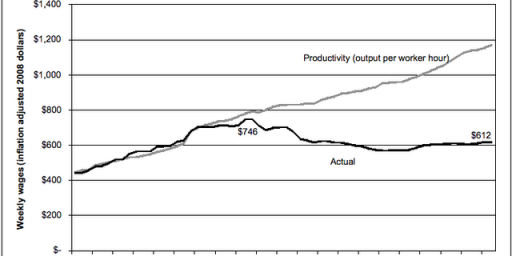Taxation and Perverse Incentives
Al Gore has come out in favor of taxing pollution (the good), and replacing payroll taxes with these pollution taxes (the bad). The potential problem is that such a set up could work against reducing pollution (the ugly).
NEW YORK (Reuters) – Former U.S. Vice President Al Gore on Monday suggested taxing carbon dioxide emissions instead of employees’ pay in a bid to stem global warming.
“Penalizing pollution instead of penalizing employment will work to reduce that pollution,” Gore said in a speech at New York University School of Law.
The pollution tax would replace all payroll taxes, including those for Social Security and unemployment compensation, Gore said. He said the overall level of taxation, would remain the same.
The problem is that taxes on pollution are intended to reduce pollution by either inducing firms to modernize/upgrade or shut down heavily polluting plants. The problem here is that if the taxes work too well, then it could be the case that revenues fall so much that the government actually doesn’t want to reduce pollution anymore. It could even be the case that the government cuts the pollution taxes to encourage more pollution to make sure that the budget is met. Not exactly the scenario one wants when trying to reduce pollution.
Think of it this way, the ideal is to drive pollution as low as possible and still enjoy as much utility (well being) as possible. But, if by driving pollution so low that the tax revenues are no longer sufficient to meet the needs of Social Security and/or Medicare then there is an incentive to allow more pollution than people might like. So taxing pollution is a good thing, but using those taxes to pay for something like Social Security, unemployment compensation or Medicare probably is not a good thing.
An even better solution could be to use a cap-and-trade program where the amount of pollution is capped and a number of permits for trading are issued and firms are allowed to buy and sell such permits. Those firms that are already efficient or find installing pollution reducing technologies more desirable can sell their permits. This will help internalize the costs of pollution and reduce the overall level of pollution. In fact, the level of permissible pollution could be set to decline over time as well. Of course some research indicates that these results are dependent on the amount of competitiveness in the economy.






So we export the pollution to other countries (and the jobs). We kill social security and unemployment because they aren’t funded. Why I think this man should run for president. I know of at least one party that would think this is brilliant.
The problem here is that if the taxes work too well, then it could be the case that revenues fall so much that the government actually doesn’t want to reduce pollution anymore.
Sounds like this, give people tax credits to switch to hybrids and the result is: As more and more hybrids hit the road, cash-strapped states are warning of rough roads ahead. Officials in car-clogged California are so worried they may be considering a replacement for the gas tax altogether, replacing it with something called “tax by the mile.”
The latter of course penalizes people who live in outlying suburbs because affordable housing is close to non-existent in city centers.
What happens if, in say a generation or so, technology becomes available and all factories emit no pollution? No tax revenues!
I think Al Gore knows this, which begs the question: why does he want to destroy Social Security? heh.
Yah, I was thinking the same thing … taxing what you want to diminish isn’t a stable income source.
But getting rid of payroll taxes and shifting the $$$ to indirect taxes, like corporate taxes, and to income taxes, might not be a bad idea; the devil’s in the details.
Same devil/detail problem with the pollution-voucher market … it could work great, or it could be set up as a farce that would allow pollution to increase untrammelled. I know which outcome I’d expect from the current White House ….
Wouldn’t the pollution tax hurt the low income population the most? How may poor can afford to buy a new Hybrid car, or other technology that would reduce emissions? Would poor people pay for new stoves, water heaters, furnaces, all which use polluting technology to operate? After all, it is very difficult to create a gas burning stove that doesn’t pollute! How expensive would this new technology be? Did Gore actually consider this?
Also, how would the poor pay for the increased utilities costs this tax would impose? Does Gore really believe that natural gas prices, for example, would not rise after this tax was imposed?
This tax idea would help the rich at the expense of the poor. I’m surprised someone from a political party that supposedly represents the poor would suggest this.
Wouldn’t the pollution tax hurt the low income population the most?
Arguably, but then, payroll taxes hurt ’em the most, too. Still, the poor don’t need a cancels-out tax bill, they need help.
Does this prove without a doubt that Algore should be in a mental facility for the criminally insane?
Our monetary system works just fine, even though the government makes money from seignioriage. The solution is to have an independent authority set the level of the tax.
Low income workers don’t pay much in income taxes, there is a graduated tax rate in America. Also, low income workers are eligible for the earned income tax credit which offsets their income tax. Not to say that low income workers don’t pay income tax, but the effect is lower than most people realise. I would say that sales taxes have the biggest effect on the poor, but I haven’t heard any politicians suggest a sales tax credit for the poor.